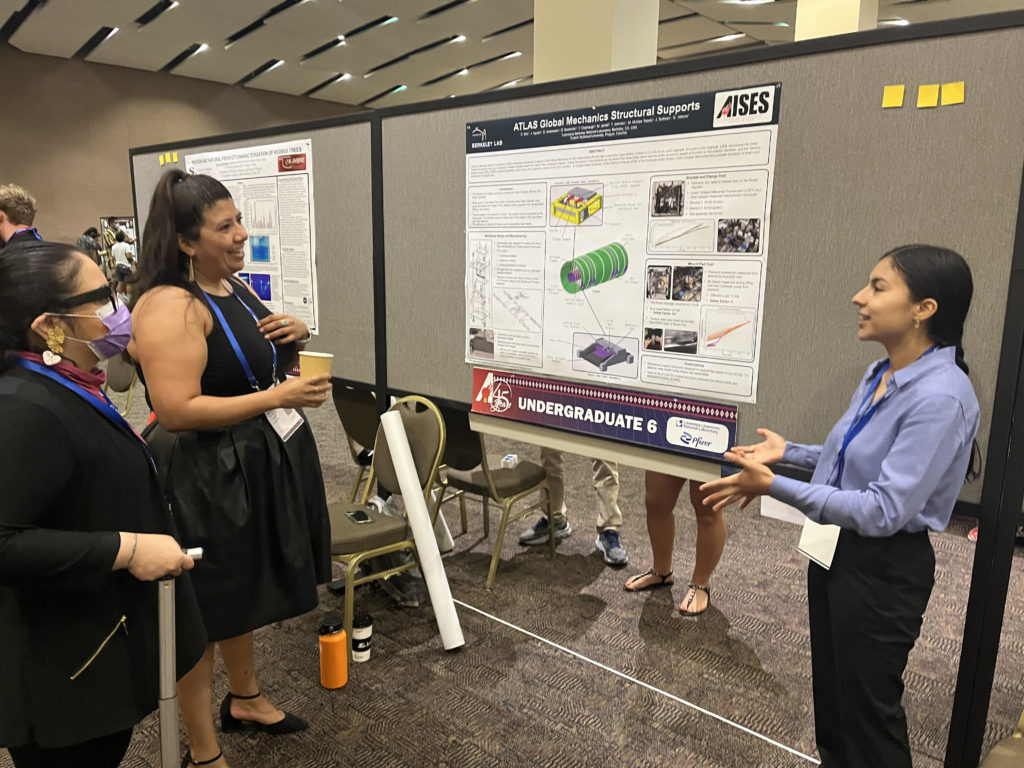
On October 6, some of Berkeley Lab’s Workforce Development & Education staff traveled to Palm Springs to attend the annual American Indian Science and Engineering Society (AISES) conference. Founded in 1977, AISES is a national nonprofit organization that focuses on increasing the representation of Indigenous peoples of North America and the Pacific Islands in science, technology, engineering, and math (STEM) studies and careers. This year’s AISES conference was its largest yet; 2,700 individuals attended the three-day event. During the conference, participants were able to attend panels with STEM professionals, connect with mentors in career development workshops, and network with recruiters from companies like Apple, Boeing, Brookhaven National Laboratory, and Pacific Northwest National Laboratory.
Along with Internship Program Manager Nakeiah Harrell, Special Projects Analyst Julio Jaramillo, and Marketing Communications Coordinator Ingrid Ockert, former WD&E intern Claudia Bird also attended AISES. Thanks to a special grant from the DOE’s Office of Science’s Workforce Development for Teachers and Scientists department, WD&E sponsored Bird’s travel to the conference. As a Community College Intern (CCI) from Berkeley City College, Bird joined Berkeley Lab’s ATLAS High Luminosity Upgrade LHC Upgrade project. She was mentored by Mechanical Engineer Jessica Aguilar and Research Scientist Dr. Giorgio Vallone.
ATLAS is just one of the Large Hadron Collider (LHC)’s many experiments. The international research project is used to conduct basic physics research about the origins of the universe. Integral to ATLAS is an incredible detector that is located 100 meters underground. Detector elements are attached to advanced carbon fiber structures, which guarantees that ATLAS’s delicate sensors remain in place during high-energy particle experiments. The Upgrade Project group was tasked with creating assemblies that would test these carbon fiber structures. With guidance from Aguilar and Todd Claybaugh, Bird learned how to make mechanical drawings that would help the ATLAS group to verify their carbon fiber structural designs. “Thanks to the help of our group,” Vallone noted, “she improved her skills and managed to implement the whole design of the experiments in our CAD (computer-aided design) program.” Bird’s drawings were then used to build experiments needed to test the detectors.
In fact, the team found Bird’s skills so valuable that she was hired as a student assistant after the internship finished. Bird will finish her Bachelors of Science in Mechanical Engineering at San José State University in May 2023. She has continued to work at Berkeley Lab.
Although Bird had previously presented her work at WD&E’s 2020 Summer Poster session, AISES presented Bird with her very first in-person conference opportunity. Presenting a poster allowed Bird to practice her communication skills. “To [allow others to] understand the work that you do,” Bird reflected, “You have to really be able to explain it in really simple terms.” Additionally, during the conference, Bird had an opportunity to network with other researchers and engineers. She also met with recruiters from an array of aerospace and commercial industries. By the end of the conference, Bird reported that she felt that she had expanded her ideas about future directions. Bird was absolutely clear on one thing: just how much that original Community College Internship (CCI) at Berkeley Lab was an instrumental part of her professional journey. “Working at the Lab has greatly impacted my view on future careers,” Bird commented. “Many of the people I have met at the Lab have come from unique backgrounds. This made me realize the breadth of opportunities available, especially for a mechanical engineer.” Thanks to her WD&E internship at Berkeley Lab, Claudia Bird is ready to soar on her own wings.
Are you interested in learning more about Workforce Development & Education’s Community College Internship (CCI) Program? Learn more on our website.
–Ingrid Ockert, Marketing Communications Coordinator

